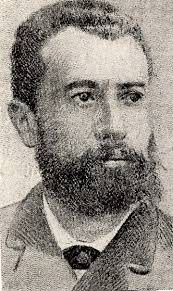
Back جيوليو پرينيتى ARZ Giulio Prinetti German Giulio Prinetti French Giulio Prinetti Italian Decreto Prinetti Portuguese Giulio Prinetti Swedish
You can help expand this article with text translated from the corresponding article in Italian. (January 2025) Click [show] for important translation instructions.
|

Giulio Nicolò Marchese Prinetti (6 June 1851 – 9 June 1908)[1] was an Italian businessman and politician from Milan.
He was the Italian Minister of Foreign Affairs in Giuseppe Zanardelli's period between 1901 and 1903, and signed the Triple Alliance (1882) renewal in 1902. Before that, he was deputy to the department of public works, elected in 1882. He became the Italian Minister of Public Works under Antonio Starabba, Marchese di Rudinì between March 1896 and December 1897. Between 1883 and 1901, he was the co-owner of the Prinetti & Stucchi automobile manufacturer. Prinetti left politics after being struck by apoplexy in 1904, and died in Rome four years later.[2]
Biography
Of noble Merate family, he was the son of the Marquis Luigi Prinetti Castelletti, who was mayor of Merate in 1864. His father's brothers, Ignazio and Carlo, were appointed senators of the kingdom, respectively in 1860 and 1874 .
Elected deputy in 1882, he quickly came to prominence among the conservatives. Having obtained the ministry of public works in the Antonio Starrabba ministry in 1897, he proved to be an iron and upright administrator.
Alongside Luigi Pelloux and Sidney Sonnino he fought against the extreme left which, in an epic parliamentary battle, prevented the legalistic coup d'état that the monarchy had promoted. In 1901, following the defeat of the reactionary right, he toned down his positions by entering the democratic and anticlerical Zanardelli-Giolitti cabinet as Foreign Minister and, in this role, he made agreements with France ( Barrère -Prinetti of 1902 ) which, confirming the already existing Visconti Venosta -Barrère agreements, aimed at guaranteeing Italy the approval of France in the African question. He had the Prinetti Decree approved, which prohibited subsidized emigration , to avoid phenomena of exploitation which occurred especially in Brazil and which was also defended by Filippo Turati [ 1 ]
After being entrusted with the foreign ministry, he left the Prinetti & Stucchi company , founded by him in Milan in 1875, with his brother-in-law Augusto Stucchi, for the production of bicycles and motor vehicles, in which he had called the young Ettore Bugatti to collaborate.
- ^ picture and biography from merateonline.it
- ^ "Giulio Prinetti dies" in New York Times (June 9, 1908)